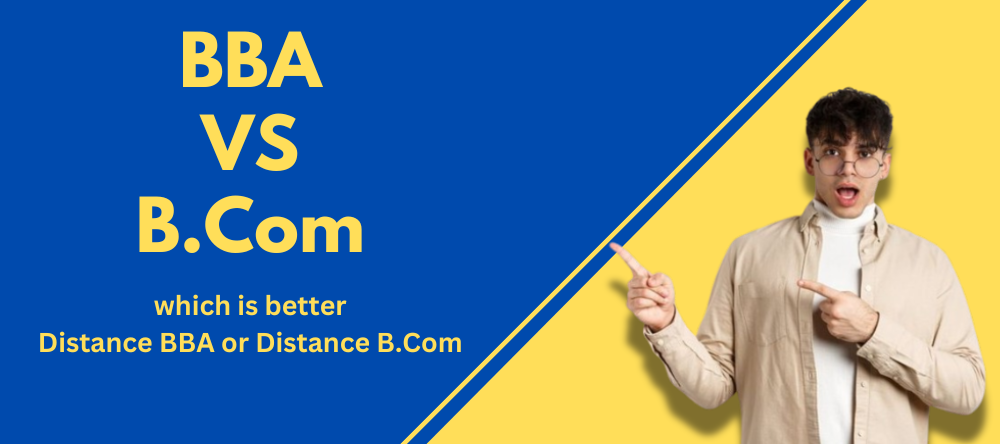
Online BBA Vs Online B.Com: What course should you choose?
Choosing Between Distance BBA and Distance B.Com: A Simple GuideAre you interested in business and considering an online degree? You might be wondering if a Bachelor of Business Administration (BBA) or a Bachelor of Commerce (B.Com) is the right choice for you. Both are popular options for students who want a flexible online program, but they focus on different areas of business.
This guide explains the key differences between distance BBA and distance B.Com to help you pick the best program for your career goals.
What's the Difference?
Here's a breakdown:
- BBA: Stands for Bachelor of Business Administration. It's a 3-year program that provides a broad foundation in business management. You'll learn about key business areas like marketing, human resources, and communication. This program is popular with students who want to pursue an MBA later or work in general management roles.
- B.Com: Stands for Bachelor of Commerce. This 3-year program focuses more on the financial side of business. You'll learn in-depth about accounting, finance, and taxation. B.Com is a great choice if you're interested in careers like banking, accounting, or starting your own business.
Distance BBA Vs Distance B.Com: Key Differences
| Parameters | BBA | B.Com |
|---|---|---|
| Full form | Bachelor of Business Administration | Bachelor of commerce |
| Objective | BBA will provide students with managerial functions such as planning, scheduling, and the overall operation of a business, as well as strong communication skills, critical thinking abilities, and reasoning capacity. | Help students learn how to do different tasks in business that involve money, accounting, and selling products. This includes understanding and using financial information, keeping track of money, and figuring out how to get people to buy things. |
| Duration | This program lasts for 3 years. You can also choose to continue it for a longer time by studying from a distance. | This program lasts for 3 years. You can also choose to continue it for a longer time by studying from a distance. |
| Eligibility | Intermediate level of education (10 + 2) | We prefer candidates who have completed their 10th standard and 12th standard with subjects related to commerce. This means we are looking for people who have finished their higher secondary education with a focus on business and related studies. |
| Minimum Percentage | Most universities require students to achieve a grade point average of 50%. | Most universities require students to achieve a grade point average of 50%. |
| Age Limit | No age constraint | No age constraint |
| Career opportunities | Digital Marketing, Financial Management, Sales Executive, Human Resource Manager, Project Manager, Business Development Executive. | Accounting, Auditing, Commercial Banking, Tax Advisor, and Financial Services. |
| Colleges/Universities | Indian Institute of Management (IIM), University of Delhi, NMIMS, St. Xavier’s College (Mumbai), Symbiosis, etc. | Chandigarh University, University of Delhi, St. Xavier’s Colleges (Mumbai), St. Joseph’s College of Commerce, Loyola College, etc. |
| Subjects | Business Communication, essentials of management, Organizational behavior, essentials of IT, etc. | Banking and Insurance, Cost Accounting, Fundamentals of Taxation, Business and Allied Law, etc. |
Choosing Between Distance BBA and Distance B.Com: What You Need to Know

Thinking about getting a business degree but want the flexibility of distance learning? Both Distance BBA and Distance B.Com are great options, but they have slightly different requirements to get in. Let's break down what you need to know:
Distance B.Com:- This is a bachelor's degree focusing on commerce subjects like accounting, finance, and taxation.
- Most universities require you to have completed Class 12th with a commerce background, though some may accept students from any stream.
- Your marks in Class 12th should generally be 50% or above, although some universities might not have a minimum requirement.
- Unlike regular B.Com, there's usually no cut-off score for distance learning.
- This program focuses on management and business administration.
- Most universities allow students from any stream in Class 12th to apply.
- Similar to B.Com, the minimum marks requirement is usually 50% or above in Class 12th, but it can vary between universities.
- Some universities might prefer students who had mathematics in Class 12th.
Note: Both Distance BBA and Distance B.Com don't have age restrictions, making them perfect for working professionals who want to upskill.
Choosing Between Distance BBA and Distance B.Com: What You'll Learn
Thinking about a business degree through distance learning? Both BBA (Bachelor of Business Administration) and B.Com (Bachelor of Commerce) are popular options, but they cater to slightly different interests. Let's break down what you can expect to learn in each program:
BBA (Management and Entrepreneurship Focus):
- This program equips you with the skills needed to run a business or manage teams.
- You'll build strong communication skills for giving presentations and interacting with colleagues.
- Courses like Business Communication, Management Essentials, Organizational Behavior, Marketing Principles, and Digital Marketing will be on your plate.
B.Com (Finance, Accounting, and Marketing Focus):
- This program delves deeper into the financial side of businesses, helping you understand money matters.
- You'll learn all about accounting, finance, law, taxes, and even management basics.
- Subjects like Banking & Insurance, Cost Accounting, Business Law, and Indian Accounting Standards might be part of your curriculum.
Choosing Between Distance BBA and Distance B.Com: Your Future Career Path
Picking between a Distance BBA and Distance B.Com can be tricky. They both fall under business studies, and graduates of either program can go on to pursue an MBA. However, there are key differences in the career paths they open up.
Here's a breakdown to help you decide which course aligns best with your goals:
Focus and Skills:- BBA: This program focuses on developing skills for management positions. You'll learn about marketing, finance, human resources, and other areas of business operations. This background gives you a strong understanding of how businesses run and prepares you for leadership roles.
- B.Com: This program delves deeper into commerce, finance, and accounting. You'll gain expertise in analyzing financial data, managing accounts, and understanding economic principles. This makes you well-suited for careers in finance, banking, and accounting.
- BBA (Management Focus): Entry-level roles in marketing, human resources, operations, and sales. As you gain experience, you can progress towards becoming a manager, director, or even start your own business.
- B.Com (Finance Focus): Careers in accounting, auditing, taxation, financial analysis, and banking. With further qualifications, you can pursue specialized fields like investment banking or become a Chartered Accountant (CA).
| Career Scope/Job Positions After BBA | Career Scope/Job Positions after B.Com |
|---|---|
| Sales & Marketing | Pursue higher studies in M.Com, CA, ICWAI, etc. |
| E-Commerce | Commercial Banking |
| Digital Marketing | Accounting and Auditing |
| Marketing Executive | Financial Services |
| Human Resource Manager | International Banking |
| Market Research Analyst | Government services |
| Pursue higher studies in MBA, PGDM, Bachelor of Education, etc | Telecommunication |
| -- | Tax advisory services |
| -- | Insurance Services |
| -- | Investment Consultant |
| -- | Loan/Credit officer |
| -- | Digital Marketing |
| -- | Customer relationship executive |
Choosing Between Business Degrees
Thinking about a business degree but stuck between Bachelor of Commerce (B.Com) and Bachelor of Business Administration (BBA)? Here's a breakdown to help you decide!
Love crunching numbers? B.Com is your jam!
If you're a whiz with accounts, finance, and calculations, B.Com is your perfect match. This program deepens your knowledge in these areas, making you a finance and accounting pro. The curriculum is designed for careers in banks, financial institutions, or anywhere finance reigns supreme. Plus, many B.Com programs offer distance learning options, letting you study online at your own pace.1
Management and Marketing Mastermind? Go for BBA!
Are you drawn to the world of management and marketing? A BBA program is your key! It hones your managerial skills in various areas, preparing you to hit the ground running in different industries. This program is particularly designed for students who want to become future leaders and business
The Bottom Line
The best course for YOU depends on your interests. Think about what gets you going: numbers and analysis, or leadership and strategy? Once you know your passion, compare the programs to see which one aligns best. The good news? Both B.Com and BBA offer distance learning options, allowing you to potentially work while you study.
FAQs (Frequently Asked Questions)
Q. Should I choose a distance BBA or a distance B.Com program?
ANS: B.Com and BBA are both college degrees for people interested in business. B.Com leans more towards finance and accounting, like keeping track of money and making reports. BBA focuses on management and starting your own business. So, B.Com grads might be better with numbers, while BBA grads might be better at leading teams or starting something new.
Q: Is BBA equivalent to B.Com?
ANS: While both BBA and B.Com are business degrees, they're not exactly the same. They teach different things! A BBA focuses on giving you the skills to run a business, like marketing and managing people. B.Com dives deeper into the money side of things, like accounting and finance.
Q: Can I get admission in distance B.Com after 10 + 2 or after 12th from the science stream?
ANS: Yes, you can! Many universities offer a Bachelor of Commerce (B.Com) degree through distance learning, even if you took science in high school (10+2).
Q. Can I study to become a Chartered Accountant after finishing my BBA through online classes?
ANS: You can definitely become a Chartered Accountant (CA) even after a BBA degree. But if you're set on becoming a CA, doing a B.Com first might be a better choice. That's because a B.Com teaches you a lot about money and accounting, which will come in super handy for the CA exams.

